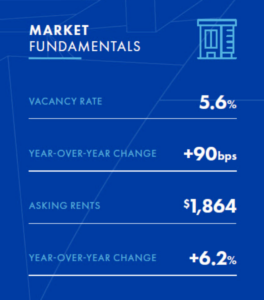
According to Northmarq’s latest market insights report — which includes market data, charts and graphs on current and historical trends for multifamily, employment, development, vacancy, rents and multifamily sales — operating conditions in the Denver multifamily market softened during the fourth quarter of 2022, as asking rents declined and the vacancy rate approached a two-year high. The cooler conditions were a function of the Denver market’s first quarter of negative net absorption in more than a decade.
Area properties recorded negative net absorption of approximately 250 units in the fourth quarter; during the past five years, absorption during the final three months of the year has averaged nearly 1,400 units. For the full year, absorption totaled approximately 6,500 units, about half of the total when renter demand surged in 2021. At the same time, the pace of supply growth accelerated in recent months, resulting in a rise in the vacancy rate.
Highlights:
- After posting mostly positive conditions throughout the first three quarters of 2022, the Denver multifamily market slowed at the end of the year. Rents inched lower, and the vacancy rate pushed higher.
- Area vacancy rose 80 basis points during the fourth quarter, reaching 5.6 percent. The rate was steady throughout much of 2022, prior to the increase at the end of the year; for the full year, the rate rose 90 basis points.
- Average rents trended lower in recent months, dropping 1.7 percent during the fourth quarter to $1,864 per month. Rent growth was particularly strong in the first half, and for the full year, rents rose 6.2 percent.
- Multifamily sales activity continued to taper off in the fourth quarter, and the number of deals in 2022 declined 30 percent from last year’s levels. The median sales price for the full year was $300,200 per unit, down 12 percent from the median price in 2021.
David Martin, managing director of investment sales at Northmarq, commented: “Until the end of 2022, the Denver market had been performing at an elevated level, with developers active, but unable to keep up with new renter household formation. So, the market is beginning this year from a healthy position. Looking ahead through the remainder of 2023, I think we’ll see a bit more equilibrium of supply-demand overall, with a few submarkets where developers are likely going to deliver more units than there is new demand for in the near term. From an investment standpoint, the built-in long-term demand drivers that attract investors to Denver remain in place.”









